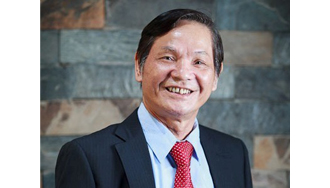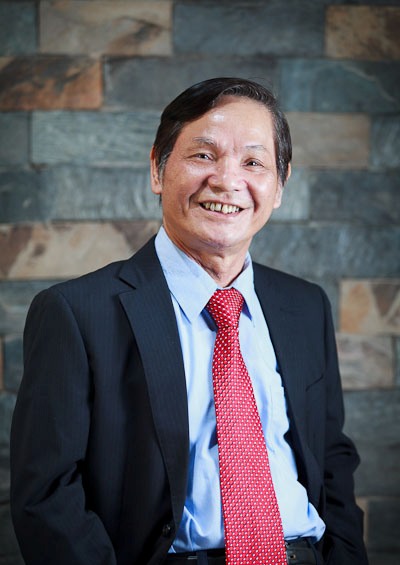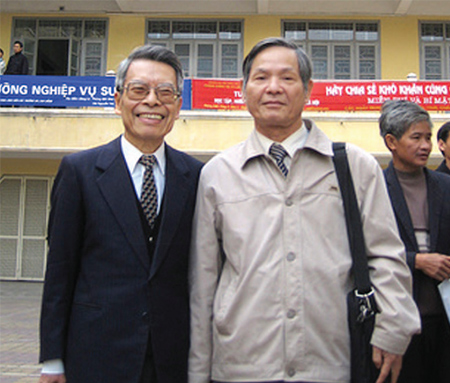
In 1978, I had just stayed at the school for a year when I was sent with Professor Nguyen Ham Duong to take students to do research on language education (Kinh language) in the ethnic minority areas of Cao Bang. At that time, traveling by car was very difficult. When arriving at the place, when returning to the villages, we had to walk mainly. Professor Nguyen Ham Duong was tall, dignified, and very elegant, looking like a Westerner. Some Tay and Nung men and women mistook me and asked me in a low voice, "Are you from the Soviet Union?". As for me, I was just like a page boy, small and skinny. Wading through streams, over hills, across villages, the oral history "Evacuation and Meaning" from the time in Dai Tu, Thai Nguyen, Professor Ham Duong told me as he remembered it, to help me relax, including stories about the teachers of the Language Department, now the Faculty of Linguistics. The story went like this. Mr. Ham Duong said: “Giap (Professor Nguyen Thien Giap) was very good. When I was in Dai Tu, my group (Language Department - VDN) sent someone to give a lecture to a department of the school (…). The brothers there valued him very much, and they had increased their production, raising goats, so they gave him one to organize a party to improve (at that time, there was no remuneration, payment like later - VDN). No one knew how to butcher, except me (Mr. Ham Duong often referred to himself intimately with his brothers and students like that). I said: Let me butcher it, but someone must help. Giap was assigned. A young cadre, a youth. I told Giap to take the goat out to the grass, tie it up, then whip it, chase it around, let it sweat all out, then butcher it to eat to feel better. So Giap had to do it right away. After a while, before I could see the goat sweat, Giap was already sweating all over. I was so amused, I said: Okay, Giap, go out.” After sweating, we killed Giap first, then the goat. The whole department almost died of laughter.” The teacher laughed and said to me: “Do you think our department is happy?” Then I kept remembering that funny story…

Prof. Dr. People's Teacher Nguyen Thien Giap
He was awarded the State Prize for Science and Technology in 2010 for the following works:Vocabularyg learn Vietnamese, Vietnamese words and word recognition.
Nearly twenty years later, heteaching staffyoung (not called that back then)lectureras now, but called like that) Nguyen Thien Giap (compared to Professor Nguyen Ham Duong when in Dai Tu) appeared in the list of Doctors, Professors, People's Teachers of the University of Social Sciences and Humanities, Vietnam National University, Hanoi; in 2010, he was recognized by the State Award Council, to step up to the honorary position of receivingState Prizeabout science and technology
Professor Nguyen Thien Giap's training process was "made in Hanoi University" 100%; and his high school education was in the countryside of Dan Phuong, Ha Tay (now part of Hanoi). In the young days of the Professor, like us, his students at that time, those who were sent to study abroad were very lucky. It was very difficult, because they had to meet many conditions. He took the entrance exam for graduate students to be sent to study abroad. He scored very high, but... he couldn't go. So... that's it. Then he still sat at the table in the communal thatched house, with earthen walls, rickety in the corner of the Me Tri dormitory in the past; and since it was a career, he had to wear out his eyes to read books, to study books. There was such a strange time.
I don't remember exactly which year, but it was certainly the last time Professor Nguyen Tai Can returned to Vietnam and then went to Moscow and passed away in 2011. One day, the Professor called me over, gave me some documents, and then he said: "This set is Giap's documents. It's been a long time. Give it back to Giap." It was a set of about a dozen old checkered student notebooks, small letters, blue ink, tightly copied with vocabulary materials in the book.Dai Nam National Phonetic Dictionary(1895-1896) by Huynh Tinh Paulus Cua. Professor Giap hand-copied that document when he had just graduated. At that time, seeing the bookDai Nam National Phonetic Dictionaryare also rare opportunities.
Then he successfully defended his doctoral thesis (formerly called associate doctoral thesis) in 1983, was recognized and appointed to the title of Professor in 1996. Before the lamp, more than a dozen books written individually and jointly, along with about dozens of research articles of the Professor were successively published, in which,Cluster of works on Vietnamese words and vocabularywon the State Prize in 2010. As a student of the Professor, in the same department, worked a lot with him, familiar and close, on the occasions when I congratulated him, I often said a somewhat silly sentence "Teacher, you have done so much work", then he said, roughly: "I am like you (he often called me like that), both were farmers, if I did not try hard, diligently and seriously to work, then what can I achieve?" I understood, that was also the advice he gave me.

Prof. Dr. People's Teacher Doan Thien Thuat and Prof. Dr. People's Teacher Nguyen Thien Giap
Two works awarded the State Prize by Professor Nguyen Thien Giap:Vietnamese Vocabulary, Vietnamese Words and Word Recognitionis a group of works that examines in-depth theoretical issues aboutfromandfrom VietnamesewithVietnamese vocabulary. With these two works, for the first time, a theoretical framework on the definition and identificationfromas well as the theoretical framework for definition and identification.Vietnamese wordssummarized quite fully, at the same time, the author's problem-solving ideas have been applied closely, thoroughly, consistently, and with high objectivity. The theoretical issues proposed by these two works have brought to Vietnamese linguistics a new way of looking at and explaining relevant issues that need to be solved, thanks to starting from the practice of Vietnamese itself, coordinating well with reasonable scientific viewpoints in linguistic theory, and at the same time, solving problems on mutually supportive observational dimensions in a dialectical way: synchronicity and diachrony, system and function, activity, center and boundary... Therefore, solving theoretical problems about Vietnamese words and word recognition avoids "over-the-top" solutions that always have to justify the consequences that follow from applying a theoretical framework that is not systematic, logical, and thorough.
Although not perfect, these two works are indeed a significant step forward in the field of theoretical research onfromVietnamese and its problemsvocabularyare relevant, if considered in terms of both novelty and systematicity, thoroughness and suitability to Vietnamese language practice. Therefore, it can be said that the two works mentioned above have contributed to the theory of words in general and the theory of Vietnamese words in particular. Regarding relevant studies on Vietnamese, there is almost no study on words that does not mention the two works mentioned above, to either agree or have to refute to turn to such a less thorough path.
The ability to overcome difficulties is easily seen in Professor Nguyen Thien Giap. During the difficult and miserable years of the country, he, like many others, spent all night reading books and worrying about food and clothing. He also had to raise pigs and chickens with his family to improve and supplement their daily lives. But he never complained about the hardships. He was good-natured and often told me cheerfully: "I am very grateful to my wife." In 1978, the Professor and I went to Da Nang to prepare for the students to do internships. The country was in a very difficult time. The Northern and Southern currencies had not yet been unified, each person on a business trip could only exchange a very small amount, I can't remember exactly how much, I only remember that it was very tight, about five dong. The Reunification train ran slowly for several days and nights before reaching Da Nang. Sitting on a wooden chair all the time, my body was stiff. Bedbugs bit and swollen my butt. The first night on the train, I was wondering how to sleep when the Professor, who seemed to be very experienced, took a raincoat he had brought, crawled under the seat and spread it out, then said: "Crawl down here and sleep." I crawled down and did as he said. The flat bag and two sets of clothes served as a pillow. The train shook. The screeching of the iron wheels on the rails still resonated in my ears. And yet, in just a moment,PeopleI slept soundly. That scouting trip was unsuccessful, we could not take students to the Western region of Quang Nam and Da Nang, because of Fulro's disturbances. We turned back and changed direction to Cao Bang; and I accompanied Mr. Ham Duong up there again. The following year, 1979, the Chinese army attacked us along the entire Vietnam-China border. The country was once again in chaos.
Professor Giap is one of the people who contributed to the strength of the department, then the Faculty of Linguistics. Linguistic theory, Vietnamese vocabulary and semantics, and Vietnamese pragmatics are the areas he is most interested in and strives to convey to his students. Dozens of graduate students have been guided by the Professor to research and successfully defend their theses. In addition to teaching at his home school (General University, University of Social Sciences and Humanities), he also taught at the University of Social Sciences and Humanities, Ho Chi Minh City, and many other universities and research institutes. In 1986 - 1988, he was a visiting professor at the University of Paris VII (France) and in 1997, he was a visiting professor at the University of the Orient, Naples, Italy. When invited and elected as Head of the Organization Department of the University, Editor-in-Chief, Deputy Director of the Publishing House of the National University of Hanoi, Head of the Department of Editing and Publishing, Faculty of Journalism, University of Social Sciences and Humanities of the National University of Hanoi, Head of the Department of Vietnamese Linguistics of the Faculty of Linguistics, Member of the Council of Professors of Linguistics, the Professor was also willing to take on the job as a job, a responsibility to the University, to the community; and then when the job was done, that was it, he quickly returned to his main career: research, teaching and training. I know, he always tried, and tried innocently, to work, to plow through words. What made me respect him more was that he highly respected the work and the results of other people's work. When hearing what his colleagues near and far had done or published, the Professor often asked me if I knew yet, if not, he would inform me. And the joy shone on his face. With new students, he often asked them warmly what they had done.
He was eager to work and loved his job, but after discussions and "dialogue" about this and that in research, in teaching, in training students, the Professor often missed his hometown, often enthusiastically told me about the poor family's favorite dish of braised taro shoots with fish, or about the old days when he went to pick bamboo shoots or pick dried xoan fruits to burn and soak them in water to make ash cakes to have the emerald green or amber-brown color of ash cakes from his hometown. Living simply, the Professor sometimes had some "strange" beliefs. When his wife, Ms. Huong, was on a business trip to Cambodia, one day, I stopped by his house on a hot summer afternoon. I knocked gently on the door, no one answered, I went to the open window, looked in, and saw a scene like Liao Zhai. The Professor was wearing shorts, shirtless, sitting still reading a book, with a few green pieces of something like leaves stuck on his body. I called out. He opened the door. I noticed some kind of leaves crumpled and stuck on his body. His son Khoa (now architect Nguyen Thien Khoa), was still very young at that time, sleeping on the floor, with a few pieces stuck on his body. I pointed at him and asked: “What are you doing?” He smiled brightly and innocently said: “It’s too hot. I have some boils. This is a secret, someone told me about it. Finely crumple apple leaves and stick them on. Anti-toxic. Very cool.” I smiled, but my smile was probably crooked, even though I couldn’t see it myself. But I also caught his joy and rare innocence.
Now, sometimes when I sit down and recall old stories, I keep thinking, is it the joy of work that attracted Professor Giap to his career and brought him sweet fruits: a happy family, many contributions to the Faculty and the School, remarkable scientific achievements, and the trust and respect of colleagues and students. I congratulate our Professor Giap; and suddenly turn around: before he could reap the fruits, how much effort he had put in... Strangely, I seem to see faintly the story of the joyful sweat of the day he slaughtered the goat from many years ago...
|
PROFESSOR, DOCTOR, PEOPLE'S TEACHER NGUYEN THIEN GIAP
+ Work unit: Faculty of Literature (Hanoi University of Science). Faculty of Linguistics (University of Social Sciences and Humanities). + Management position: Deputy Head, Party Secretary of the Faculty of Literature (Hanoi University of Science) (1989-1992). Head of Personnel Organization Department, Deputy Secretary of the Party Committee of Hanoi University of Science (1992-1996). Head of Department of Social Sciences and Humanities (Faculty of Journalism), Head of Department of Editing and Publishing (Faculty of Journalism) (1991-1996). Standing member of the Party Committee of Hanoi National University, Deputy Secretary of the Party Committee of the University of Social Sciences and Humanities (1996-2000). Deputy Director, Editor-in-Chief of Hanoi National University Publishing House (2000-2003). Head of Vietnamese Linguistics Department (Faculty of Linguistics) (1996-2014).
Visiting Professor, University of the Orient, NAPOLY, Italy (1997).
Vietnamese words and vocabulary, Hanoi National University Publishing House, 2015. Linguistics textbook, Hanoi National University Publishing House, 2008. Brief History of Vietnamese Linguistics, volume 1, 2004; volume 2, 2006 (Good books celebrating the 50th anniversary of the founding of Hanoi Education Publishing House). 4.777 linguistic concepts, Hanoi National University Publishing House, 2010 (Hanoi National University Science and Technology Award, 2010) Methodology and methods of language research, Vietnam Education Publishing House, 2012 (Bronze Prize for Best Book 2013).
+ State Prize for Science and Technology in 2010 for a cluster of works on Vietnamese vocabulary and lexicology, includingVietnamese vocabulary, Vietnamese words and word recognition. + Hanoi National University Science and Technology Award 2010 for the project4. 777 linguistic concepts. + Bronze Prize for Good Book 2013 for the workMethodology and methods of language research. |
Author:Prof. Dr. Vu Duc Nghieu